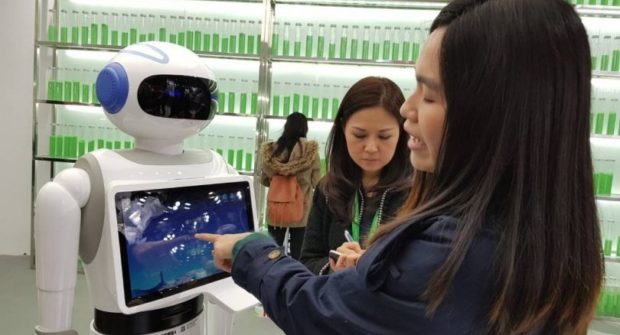GUANGZHOU, China — Facial recognition and artificial intelligence (AI) have become the major digital trends in China as consumers demand convenience, personalised experiences and time savings.
At WeChat Open Class PRO 2019 held in Guangzhou last week, the Chinese Internet giant Tencent Holdings showcased a range of cutting-edge services and products that use those technologies to facilitate “smart business” and “smart living”.
The services or solutions are provided by Tencent and WeChat for its business partners and to facilitate the experience of WeChat users.
Highlights of the event:
Smart shopping
The automated shopping “scan-to-buy” service based on WeChat’s Mini Program has been widely introduced in physical stores, including Carrefour and Walmart. Shoppers can use their WeChat Pay to scan and transfer money without having to go to the cashier counter or wait in long queues. A payment system based on facial recognition has also been adopted in some stores to enable shoppers to pay and exit quickly.
Fashion retailers offer shoppers in China this payment method. When customers choose their clothes they can scan their face at a screen to pull up their shop member account and then place the clothes at a counter that uses a radio frequency identification reader (RFID reader). The payment is processed without the need to scan their mobile QR code to pay.
Smart hotels
Leading hotels Hilton, Shangri-La and InterContinental Hotel in China, among others, are using Tencent’s advanced cloud and AI technologies, social networks and payment tools to build futuristic smart hotels.
What makes the hotels “smart” is that guests can book rooms, check in remotely and use their phones as key cards – all on the WeChat app. Guest identity is verified at the hotel through facial recognition, which grants access to a digital keycard, and also gives access to services like breakfast vouchers and a 24-hour butler that can be called up through WeChat.
Guests can also order room service, adjust things like air conditioning, curtains and lighting, and make payments via the app.
Smart car parks
WeChat has built an automated payment system, or pay-by-plate, that leverages payment and licence plate-recognition technologies. Users can free their hands from their smart devices when paying for car parking.
Users have the option to register their licence plate numbers under their WeChat accounts. Their plates are then scanned by specially set-up cameras at the exits of car parks. The AI-based system automatically matches the captured image of the plate number with the company’s database of WeChat Pay users to determine the subsequent account and settle the parking fees.
Smart fuel stations
Licence plate recognition, together with Mini Program and WeChat payment, allows a Chinese service station to provide an intelligent refuelling experience for drivers.
WeChat users can link their WeChat account to car plates to perform automatic payment.
When entering the service station, the system will automatically identify the driver’s pre-filled licence plate, read the product preferences and automatically scan the drivers’ past fuel history. This allows cars to begin refuelling the moment they arrive. After the fill-up, the Mini Program will automatically settle the payment and send the receipt to the driver on WeChat.
Medical robots
Pharmacies across China use humanoid robots with software developed by Tencent to give initial analysis of customers’ symptoms and to suggest a prescription. After seeking advice from the “E-doctor”, patients move on to purchase the over-the-counter medications.
